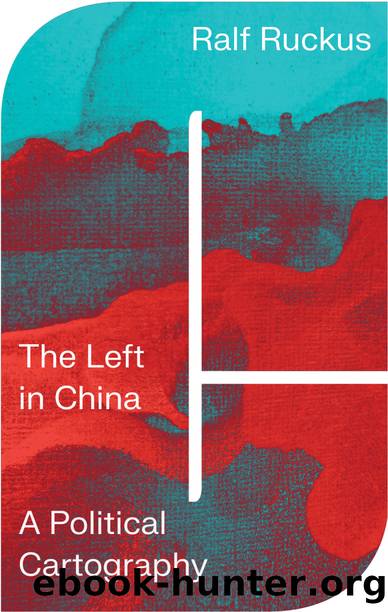The Left in China by Ruckus Ralf;

Author:Ruckus, Ralf;
Language: eng
Format: epub
Publisher: Pluto Press
Tough Times
In sum, the oppositional left that had reorganized in the course of the 1990s changed further in the following decades. Leftists engaged in (labor) NGOs supporting the struggles of migrant workers. They founded oppositional groups and engaged in online debates on the new class composition and leftist strategies throughout the 2010s. Maoism remained the main political ideology of leftist groups. Far fewer leftists supported other positions, such as Trotskyism and social democracy.
The Maoists organize in various circles and networks but have not managed to set up larger organizational cores. They are divided on various, often overlapping issues: some being preoccupied with the CCPâs old socialist project vs. others who focus on the reform-period capitalism or so-called market socialism âwith Chinese characteristicsâ (zhongguo tese); an old generation formerly involved in the Cultural Revolution and later struggles and focusing on the old socialist working class vs. a young generation of Maoists supporting the new migrant working class; reformist positions with a focus on gradual change of CCP politics vs. revolutionary positions for the development of power from below; and a majority supporting the CCP regimeâs nationalist global strategies vs. a minority holding on to the idea of a global left-wing or working-class movement. As a result, an oppositional Maoist Left promoting class struggle and change from below stands against a loyalist Maoist Right that supports the CCP regime and authoritarian governance.
Many from the Maoist Right or other groups claiming to be left-wing in some way support the party leadership for its strengthening of party rule; its pursuit of nationalist policies abroad; the repression in Xinjiang, Tibet, and Hong Kong to defend the countryâs territory; the attacks on liberals and on âWestern influencesâ; or the more recent pressure on tech companies and the plan to introduce property taxes. Most of these policies are neither in the interest of the working class(es) nor left-wing per se.
The CCP regime has tolerated the Maoist Right and also managed to coopt leftist discourses and actors. The Maoist Left and other oppositional left-wing groups and circles have suffered from the repression of leftist activism in recent years. Today, most of these circles avoid public visibility and act very carefully when supporting social struggles.
Besides these left-wing circles and the ongoing workersâ protests that inspired them, a second dialectic of social struggles and activist organizing shaped the past two decades in the PRC with women* and feminists as the main protagonists.
Download
This site does not store any files on its server. We only index and link to content provided by other sites. Please contact the content providers to delete copyright contents if any and email us, we'll remove relevant links or contents immediately.
| Central Asia | Southeast Asia |
| China | Hong Kong |
| India | Japan |
| Korea | Pakistan |
| Philippines | Russia |
The Sympathizer by Viet Thanh Nguyen(4102)
The Rape of Nanking by Iris Chang(4029)
World without end by Ken Follett(3351)
Ants Among Elephants by Sujatha Gidla(3282)
Blood and Sand by Alex Von Tunzelmann(3067)
Japanese Design by Patricia J. Graham(3010)
City of Djinns: a year in Delhi by William Dalrymple(2439)
Foreign Devils on the Silk Road: The Search for the Lost Treasures of Central Asia by Peter Hopkirk(2393)
Inglorious Empire by Shashi Tharoor(2349)
The Queen of Nothing by Holly Black(2338)
India's Ancient Past by R.S. Sharma(2309)
In Order to Live: A North Korean Girl's Journey to Freedom by Yeonmi Park(2306)
Tokyo by Rob Goss(2297)
India's biggest cover-up by Dhar Anuj(2254)
Tokyo Geek's Guide: Manga, Anime, Gaming, Cosplay, Toys, Idols & More - The Ultimate Guide to Japan's Otaku Culture by Simone Gianni(2246)
The Great Game: On Secret Service in High Asia by Peter Hopkirk(2234)
Goodbye Madame Butterfly(2168)
Batik by Rudolf Smend(2013)
Living Silence in Burma by Christina Fink(1991)
